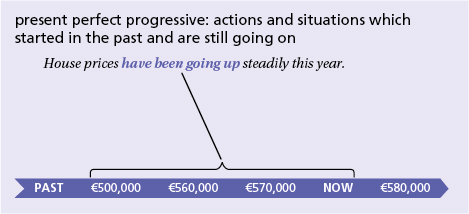Present perfect progressive
Forms
have/has been + -ing
- I have been thinking about you.
- Have you been waiting long?
- I haven’t been studying very well recently.
For double letters in words like sitting, stopping, (see here).
Continuing actions and situations
We use the present perfect progressive to look back over actions and situations which started in the past and are still going on.
- I’ve been working very hard recently.
- It’s been raining all day. I’m tired of it.
- Food prices have been going up steadily all this year.
We often use the present perfect progressive to talk about people’s use of their time up to the present.
- ‘Hi! What have you been doing with yourself?’ ‘I’ve been trying to write a novel.’
- That kid has been watching TV non-stop since breakfast.

Actions and situations that have just stopped
We also use the present perfect progressive for actions and situations which have just stopped, but which have present results.
- ‘You look hot.’ ‘Yes, I’ve been running.’
- Sorry I’m late. Have you been waiting long?
- I must just go and wash. I’ve been gardening.
Repeated actions
We can use the present perfect progressive not only for continuous activity, but also for repeated activity.
- People have been phoning me all day.
- I’ve been waking up in the night a lot. I think I’ll see the doctor.
Time expressions: recently, lately, this week, since …, for …, etc
We often use the present perfect progressive with words that refer to a period of time continuing up to now, like recently, lately, this week, since January, for the last three days.
- The company has been losing money recently.
- Jack’s been walking in Scotland all this week.
- I’ve been doing a new job since January.
- It’s been raining for the last three days.
For the difference between since and for, (see here).
Not used with finished time expressions
We cannot use the present perfect progressive with expressions that refer to a finished period of time.
- ‘You look tired.’ ‘Yes. I was cycling from ten this morning until five o’clock.’ (not
… I’ve been cycling from ten this morning until five o’clock.)
how long?
We use the present perfect progressive, not the present progressive, to talk about how long something has been happening.
- How long have you been studying English? (not
How long are you studying …?) - I’ve been working here for two months. (not
I’m working here for two months.)
For details, (see here).
Present perfect progressive and (simple) present perfect
In some cases, we can also use the simple present perfect to talk about actions and situations continuing up to the present. Compare:
- How long have you been working with her?
How long have you known her? - That man has been standing on the corner all day.
For 900 years the castle has stood on the hill above the village.
For the differences, (see here).
A bad rule
Grammars sometimes simply say that the present perfect progressive is used ‘for actions or situations that started in the past and are still going on’. This is true, but incomplete and unhelpful. To talk about actions and situations that started in the past and are still going on, we normally use present tenses (everything that is going on now started in the past!). The difference is that we use the present perfect progressive when we are looking back over something that is still going on – for example when we say how long it has lasted. Compare:
- It’s raining.
It’s been raining all day. - I’m working very hard at the moment.
I’ve been working very hard recently.